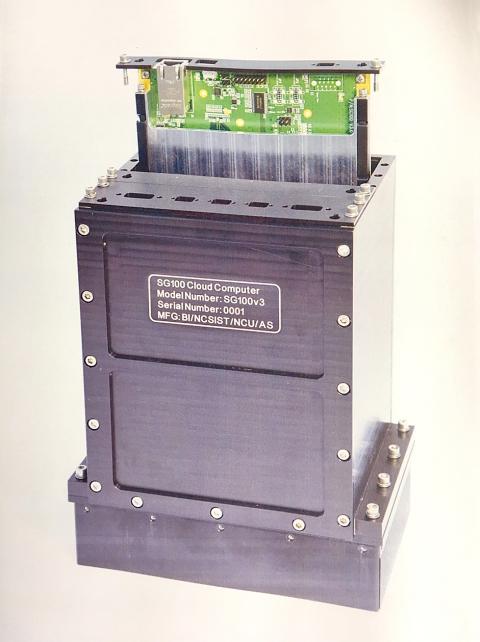A computer designed in Taiwan was sent to the International Space Station (ISS) for testing for a long-term contract, a Chungshan Institute of Science and Technology official has confirmed.
The SG100 Cloud Computer was designed by the institute after NASA opened the contract for the computer to worldwide bids, and it is capable of performing cloud-based computations and upgrading itself during space missions, the official said.
NASA selected the computer for its OA-7 mission after it passed the US space agency’s evaluations with a perfect score, the official added.

Photo courtesy of the Chungshan Institute of Science and Technology
NASA launched the OA-7 mission on April 18 to supply the space station with an Orbital ATK rocket, and the SG100’s components were included in the shipment for assembly at the station.
If the SG100 passes a six-month field trial, the institute will be contracted by NASA to design its next-generation space mission computers, the official said.
The SG100 Cloud Computer program was a joint effort by the institute, Academia Sinica and National Central University.
The Institute of Nuclear Energy Research and the Chang Gung Memorial Hospital’s Lin-kuo Branch allowed the design team to use their particle accelerator to test the computer’s performance in space-like conditions.
“Data generated by planning, design, analysis and simulation tasks involved in the process had all been evaluated by NASA experts... The final product was then subjected to NASA’s rigorous environmental testing, which the SG100 passed flawlessly,” the official said.
The design team worked with NASA on the computer used by the space station’s alpha magnetic spectrometer (AMS), a computer that has been in use at the station since 2001.
The AMS project was headed by Nobel laureate Samuel Ting, a Taiwanese-American physicist, who was also involved in the development of the SG100.
The OA-7 mission is to involve four key experiments, including testing of the SG100.
The institute last year announced that it was building a lunar lander for NASA’s Resource Prospector mission, which aims to be the first mining expedition on the moon in the early 2020s.
The lunar lander is expected to be completed by next year and the mission is expected to be launched in the early 2020s — if it is given the green light, institute officials said in July last year.

Intelligence agents have recorded 510,000 instances of “controversial information” being spread online by the Chinese Communist Party (CCP) so far this year, the National Security Bureau (NSB) said in a report yesterday, as it warned of artificial intelligence (AI) being employed to generate destabilizing misinformation. The bureau submitted a written report to the Legislative Yuan in preparation for National Security Bureau Director-General Tsai Ming-yen’s (蔡明彥) appearance before the Foreign Affairs and National Defense Committee today. The CCP has been using cognitive warfare to divide Taiwanese society by commenting on controversial issues such as Taiwan Semiconductor Manufacturing Co’s (TSMC, 台積電) investments in the

INVESTIGATION: The case is the latest instance of a DPP figure being implicated in an espionage network accused of allegedly leaking information to Chinese intelligence Democratic Progressive Party (DPP) member Ho Jen-chieh (何仁傑) was detained and held incommunicado yesterday on suspicion of spying for China during his tenure as assistant to then-minister of foreign affairs Joseph Wu (吳釗燮). The Taipei District Prosecutors’ Office said Ho was implicated during its investigation into alleged spying activities by former Presidential Office consultant Wu Shang-yu (吳尚雨). Prosecutors said there is reason to believe Ho breached the National Security Act (國家安全法) by leaking classified Ministry of Foreign Affairs information to Chinese intelligence. Following interrogation, prosecutors petitioned the Taipei District Court to detain Ho, citing concerns over potential collusion or tampering of evidence. The

‘COMPREHENSIVE PLAN’: Lin Chia-lung said that the government was ready to talk about a variety of issues, including investment in and purchases from the US The National Stabilization Fund (NSF) yesterday announced that it would step in to staunch stock market losses for the ninth time in the nation’s history. An NSF board meeting, originally scheduled for Monday next week, was moved to yesterday after stocks plummeted in the wake of US President Donald Trump’s announcement of 32 percent tariffs on Taiwan on Wednesday last week. Board members voted to support the stock market with the NT$500 billion (US$15.15 billion) fund, with injections of funds to begin as soon as today. The NSF in 2000 injected NT$120 billion to stabilize stocks, the most ever. The lowest amount it

NEGOTIATIONS: Taiwan has good relations with Washington and the outlook for the negotiations looks promising, Minister of Economic Affairs J.W. Kuo said Taiwan’s GDP growth this year is expected to decrease by 0.43 to 1.61 percentage points due to the effects of US tariffs, National Development Council (NDC) Minister Paul Liu (劉鏡清) said at a meeting of the legislature’s Economics Committee in Taipei yesterday, citing a preliminary estimate by a private research institution. Taiwan’s economy would be significantly affected by the 32 percent “reciprocal” tariffs slapped by the US, which took effect yesterday, Liu said, adding that GDP growth could fall below 3 percent and potentially even dip below 2 percent to 1.53 percent this year. The council has commissioned another institution